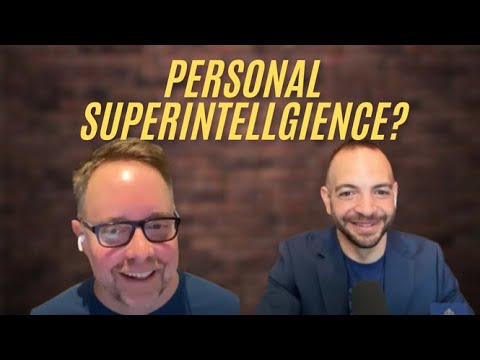In this episode of the Big Technology Podcast, Alex and M.G. Siegler discuss Mark Zuckerberg’s vision of creating a personalized “super intelligence” AI that enhances individual experiences, contrasting it with other tech giants’ approaches, while also addressing the complexities and marketing hype surrounding AI terminology and industry dynamics. They further explore AI’s societal impacts, including potential effects on social relationships and writing, highlighting both opportunities and challenges as the technology reshapes communication, workforces, and human interaction.
Mark Zuckerberg’s Personal Superintelligence, Layoffs & Payoffs, Writing With AI — With M.G. Siegler
In this episode of the Big Technology Podcast, host Alex and guest M.G. Siegler discuss Mark Zuckerberg’s vision of building a “personal super intelligence” and what that term really means beyond marketing hype. Zuckerberg’s memo outlines Meta’s goal to create AI that empowers individuals personally rather than centrally automating all valuable work, distinguishing Meta’s approach from other big tech companies. Siegler notes that while the term “super intelligence” is nebulous and often used for branding, Zuckerberg’s focus on personalization leverages Meta’s unique advantage of having billions of social network users, aiming to enhance personal relationships and experiences through AI.
The conversation then shifts to the broader AI landscape, where big tech companies like Microsoft, Google, Amazon, and Meta hold significant stakes in various AI startups, creating a complex ecosystem of investments and collaborations. Siegler highlights that despite the massive capital being poured into AI infrastructure and talent—illustrated by Meta’s reported $100 million offers to top AI talent—there are simultaneous large-scale layoffs in tech companies. This paradox is explained as a strategic move to restructure workforces, focus on AI-driven innovation, and reassure investors amid the transformational moment AI represents.
Siegler and Alex also delve into the challenges of defining terms like AI, AGI (Artificial General Intelligence), and super intelligence, emphasizing that these labels are often marketing-driven and lack clear, universally accepted definitions. The discussion touches on contractual nuances, such as Microsoft’s agreement with OpenAI that restricts Microsoft from independently developing AGI, which has influenced how companies brand and approach their AI efforts. Despite the confusion, all players are essentially working toward similar advanced AI capabilities, with varying focuses and branding strategies.
The episode further explores the societal implications of AI, particularly in social media and personal interactions. They consider the possibility that AI could replace human friends with AI-generated companions, potentially exacerbating loneliness and insularity despite increasing connectivity. The hosts acknowledge both the positive and negative potentials of AI in social contexts, noting that while AI can enhance communication and leisure, it may also deepen social isolation if people substitute AI interactions for human relationships.
Finally, the discussion turns to AI’s role in writing and communication. Siegler expresses skepticism about relying on AI for creative or thoughtful writing, emphasizing that writing is a cognitive process that helps organize and develop one’s thoughts. While AI can automate tedious tasks like email writing, overreliance on AI-generated text risks diminishing critical thinking and personal expression. They also touch on concerns about academic integrity with AI-assisted cheating but suggest that society will eventually find a balance. The episode closes with a reflection on the evolving AI landscape and the ongoing need to understand and adapt to its impacts on technology, business, and society.
